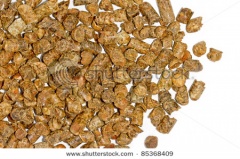Difference between revisions of "Citrus Pellets"
From Cargo Handbook - the world's largest cargo transport guidelines website
| Line 4: | Line 4: | ||
| stowage factor = 1.68 m3/t | | stowage factor = 1.68 m3/t | ||
| angle of repose = approx. 40° | | angle of repose = approx. 40° | ||
| − | | humidity and moisture = <ul><li>Relative humidity: 70%</li><li>Water content: 8 - 12%</li><li>Maximum equilibrium moisture content | + | | humidity and moisture = <ul><li>Relative humidity: 70%</li><li>Water content: 8 - 12%</li><li>Maximum equilibrium moisture content: 70% |
| − | | oil content = | + | | oil content = 0.1 - 1.0% |
| − | | ventilation = | + | | ventilation = Recommended ventilation conditions: surface ventilation. As with bulk cargoes of expeller, pellets are also often not ventilated. In order to avoid moisture damage on the surface of the cargo, ventilation must not be performed with cold external air. The ventilation system must then be switched to return air. |
| − | | risk factors = | + | | risk factors = Citrus pellets are liable to the risk of self-heating/spontaneous combustion. |
}} | }} | ||
Revision as of 16:14, 22 February 2012
| Infobox on Citrus Pellets | |
|---|---|
| Example of Citrus Pellets |  |
| Facts | |
| Origin | This Table shows only a selection of the most important countries of origin and should not be thought of as exhaustive.
|
| Stowage factor (in m3/t) | 1.68 m3/t |
| Angle of repose | approx. 40° |
| Humidity / moisture |
|
| Oil content | 0.1 - 1.0% |
| Ventilation | Recommended ventilation conditions: surface ventilation. As with bulk cargoes of expeller, pellets are also often not ventilated. In order to avoid moisture damage on the surface of the cargo, ventilation must not be performed with cold external air. The ventilation system must then be switched to return air. |
| Risk factors | Citrus pellets are liable to the risk of self-heating/spontaneous combustion. |











